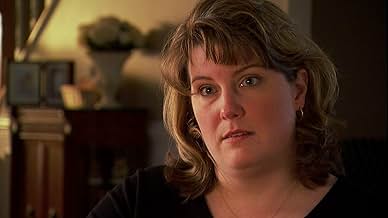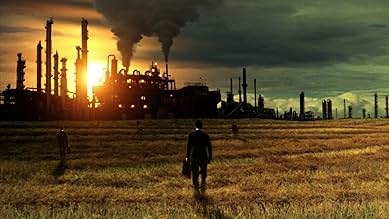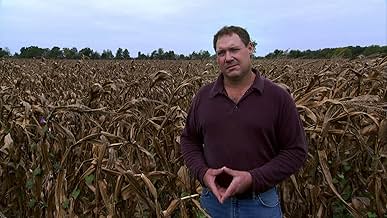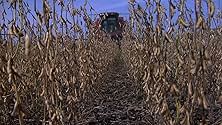An unflattering look inside America's corporate controlled food industry.An unflattering look inside America's corporate controlled food industry.An unflattering look inside America's corporate controlled food industry.
- Director
- Writers
- Stars
- Nominated for 1 Oscar
- 7 wins & 20 nominations total
- Director
- Writers
- All cast & crew
- Production, box office & more at IMDbPro
7.853K
1
2
3
4
5
6
7
8
9
10
Featured reviews
a food monoculture
Robert Kenner's movie is a perfect illustration of F. William Engdahl's book 'Seeds of Destruction', which explains how international agribusinesses are trying to monopolize vertically and horizontally (and profit from) food production on a world scale.
The world's food chain is built mainly on heavily subsidized and, therefore, cheap corn. In fact, all humans chew corn the whole day long from bread over meat (all animals are fed with corn) to deserts and drinks. Transnational corporations are even trying to learn fish to eat corn. Corn becomes nearly a food monoculture. A particular transnational company even developed through genetic engineering highly efficient corn seed which it patented, thereby creating a nearly seed monopoly. Buyers cannot use the produce of the seeds as plant seed for future harvests. The company's own inspection force controls with hawk eyes that its clients buy new genetically modified seed every year. Some of the company's supporters and former directors occupy key positions in US governments and government administrations (FDA).
The movie shows the disastrous effects of intensive farming on animals, as well as the health and environmental risks of diminished standards at livestock farming and slaughtering houses. Fortunately, some biological farmers show more respect for their animals and for their clients.
At the end of the movie, the makers give a perfect list of recommendations for those wishing to eat 'healthy' food.
This movie is a must see for all those who want to understand the world we live in.
The world's food chain is built mainly on heavily subsidized and, therefore, cheap corn. In fact, all humans chew corn the whole day long from bread over meat (all animals are fed with corn) to deserts and drinks. Transnational corporations are even trying to learn fish to eat corn. Corn becomes nearly a food monoculture. A particular transnational company even developed through genetic engineering highly efficient corn seed which it patented, thereby creating a nearly seed monopoly. Buyers cannot use the produce of the seeds as plant seed for future harvests. The company's own inspection force controls with hawk eyes that its clients buy new genetically modified seed every year. Some of the company's supporters and former directors occupy key positions in US governments and government administrations (FDA).
The movie shows the disastrous effects of intensive farming on animals, as well as the health and environmental risks of diminished standards at livestock farming and slaughtering houses. Fortunately, some biological farmers show more respect for their animals and for their clients.
At the end of the movie, the makers give a perfect list of recommendations for those wishing to eat 'healthy' food.
This movie is a must see for all those who want to understand the world we live in.
Pass (on) the Corn
Greetings again from the darkness. Was reticent to see this one thinking I might never want to eat again. Much of what is in the film is not really new, but the entire segment on corn was really an eye opener.
No real surprise that a few giant companies, with governmental subsidies, control our entire food market ... and that it run like a giant factory and not Grandpa's farm. Still it is painful to watch what the workers and animals and farmers are subjected to.
The two messages we are left with - push the government for better controls and power by the FDA and USDA, and eat more organic food ... even if it is more expensive.
No real surprise that a few giant companies, with governmental subsidies, control our entire food market ... and that it run like a giant factory and not Grandpa's farm. Still it is painful to watch what the workers and animals and farmers are subjected to.
The two messages we are left with - push the government for better controls and power by the FDA and USDA, and eat more organic food ... even if it is more expensive.
One of the Best Documentaries I have seen in a while, and Canada can learn a lot from this mess....
Did you know that it only takes 48 days for a chicken to go to market. Is this natural? This film explores how food is grown, and the concerns that people have, such as the e-coli outbreak that seems to happen every year. I am a lover of meat, but after this film you will want to change some of your practices like switching to Organic etc. This film also explores demand for certain products that are not Genetically modified.
We all have to eat but we can make decisions based on facts, instead of based on perception. People need to be aware that their consequences may have dire repercussions, so if you need to eat, and we all do, then go out and see this.
We all have to eat but we can make decisions based on facts, instead of based on perception. People need to be aware that their consequences may have dire repercussions, so if you need to eat, and we all do, then go out and see this.
just the facts!
This documentary does a good job educating the consumers on how food is produced,packed and marketed in U.S nowadays. By going back repeatedly to how it was before it shows us how much it has evolved and also the effects of those drastic changes on food prices, American eating habits and ultimately on their health. The movie does all that without ever going over the top or becoming apocalyptic, which seems to be a trend for these type of movies nowadays,it does call out the greedy mega food corporation and the state officials for not arming the regulatory agencies better but the consumers are also at fault here for not informing themselves enough on the content of the products in order to choose what's best for their health not just for their wallet.
Must-see documentary for anyone who eats
It is said that if you like eating sausage, you better not see how it is made. If you like eating meat, don't watch an animal being killed. If you have your fill of fruits and vegetables daily, don't think about the pesticides that coat them.
Our modern society has sanitized the presentation of food so that we can blissfully ignore what we should be concerned with: where food comes from, how it is raised, picked, handled, altered, transported and sold. Instead our attention is focused only on the awesome number of beautiful packages on market shelves, the unblemished fruits and vegetables available year round. In our increasingly artificial world appearance trumps taste, price trumps provenance, and industrialization gives us a false sense of safety.
It is therefore opportune to have the release of "Food, Inc". After you see it, you'll probably not shop for food in the same way. You may even change the kinds of food you eat. Not enough to convince me to become a vegetarian, but the ubiquitousness of corn and its derivatives, stated multiple times in the film, has made scouring of package labels a routine. The easy rule of not buying anything that contains more than five ingredients more frequently obeyed.
The film contains material that has already been brought out by others, for examples, (1) the problem of genetically modified seeds crossing into properties that do not want them and (2) the appalling conditions in which farm animals are kept. Some material is stressed too much, for example, the whole issue surrounding the tragic death of a kid from a very virulent form of E.coli and the attempts to establish regulations that might prevent such deaths. Individual cases are worth mentioning, but systemic and widespread issues are more compelling. The death of one is no doubt a tragedy but the impairment of thousands is of greater social consequence.
The issue of food regulation in general is a subject that I would have liked to see more of. The adverse effect of more regulation (as per the example above) can be too much regulation. The subject is briefly broached by the "good farmer" (Joel Salatin) who kills his chickens in the open. Ironically those chickens are likely to be more healthy and tasty. Regulation may eliminate this practice. Regulation can therefore have a negative impact on food culture. One of the best example of this is preventing the importation into the US of many delicious young unpasteurized cheese from Europe or even the marketing of such cheese by US producers. How many get sick from those cheese compared to the number of sick from peanut butter or spinach?
The film unwittingly projects a bit of naiveté in a couple of places. The segment about an individual being sued by a food conglomerate and essentially losing for lack of money is not news. This is a capitalist system: more money, better lawyers, almost certain victory. Yet the point is well taken that the food conglomerates are behaving in thuggish ways and acting with the protection of a complicit government (the best money can buy). But again, uncontrolled capitalism generates monopolies and they will fight tooth and nail to retain control and squash any semblance of competition. It's the logic of the beast. This not limited to food. Since voting habits have brought the US to this state of affairs, our only recourse as consumers is to eat bananas, and only bananas, for breakfast, lunch and dinner. It's called the Chiquita Diet.
In any case, this is a must-see documentary. The director is to be commended for having the courage of tackling this very important topic.
Don't forget to buy a five gallon basket of popcorn dripping with oleo and a big soda with plenty of high fructose corn syrup before going into the screening room. It may be the last time you do.
Our modern society has sanitized the presentation of food so that we can blissfully ignore what we should be concerned with: where food comes from, how it is raised, picked, handled, altered, transported and sold. Instead our attention is focused only on the awesome number of beautiful packages on market shelves, the unblemished fruits and vegetables available year round. In our increasingly artificial world appearance trumps taste, price trumps provenance, and industrialization gives us a false sense of safety.
It is therefore opportune to have the release of "Food, Inc". After you see it, you'll probably not shop for food in the same way. You may even change the kinds of food you eat. Not enough to convince me to become a vegetarian, but the ubiquitousness of corn and its derivatives, stated multiple times in the film, has made scouring of package labels a routine. The easy rule of not buying anything that contains more than five ingredients more frequently obeyed.
The film contains material that has already been brought out by others, for examples, (1) the problem of genetically modified seeds crossing into properties that do not want them and (2) the appalling conditions in which farm animals are kept. Some material is stressed too much, for example, the whole issue surrounding the tragic death of a kid from a very virulent form of E.coli and the attempts to establish regulations that might prevent such deaths. Individual cases are worth mentioning, but systemic and widespread issues are more compelling. The death of one is no doubt a tragedy but the impairment of thousands is of greater social consequence.
The issue of food regulation in general is a subject that I would have liked to see more of. The adverse effect of more regulation (as per the example above) can be too much regulation. The subject is briefly broached by the "good farmer" (Joel Salatin) who kills his chickens in the open. Ironically those chickens are likely to be more healthy and tasty. Regulation may eliminate this practice. Regulation can therefore have a negative impact on food culture. One of the best example of this is preventing the importation into the US of many delicious young unpasteurized cheese from Europe or even the marketing of such cheese by US producers. How many get sick from those cheese compared to the number of sick from peanut butter or spinach?
The film unwittingly projects a bit of naiveté in a couple of places. The segment about an individual being sued by a food conglomerate and essentially losing for lack of money is not news. This is a capitalist system: more money, better lawyers, almost certain victory. Yet the point is well taken that the food conglomerates are behaving in thuggish ways and acting with the protection of a complicit government (the best money can buy). But again, uncontrolled capitalism generates monopolies and they will fight tooth and nail to retain control and squash any semblance of competition. It's the logic of the beast. This not limited to food. Since voting habits have brought the US to this state of affairs, our only recourse as consumers is to eat bananas, and only bananas, for breakfast, lunch and dinner. It's called the Chiquita Diet.
In any case, this is a must-see documentary. The director is to be commended for having the courage of tackling this very important topic.
Don't forget to buy a five gallon basket of popcorn dripping with oleo and a big soda with plenty of high fructose corn syrup before going into the screening room. It may be the last time you do.
Did you know
- TriviaOn the Region 1 DVD packaging, the UPC bar-code on the cow is different from the one shown on the theatrical poster. The bar-code on the poster is 4-73762-52481-6-(18). The bar-code on the Region 1 DVD packaging is 8-76964-00216-5 : the same bar-code that appears on the back cover of the DVD. As of 2022, the bar-code used on the poster is not an active code.
- Quotes
Michael Pollan: There are no seasons in the American supermarket. Now there are tomatoes all year round, grown halfway around the world, picked when it was green, and ripened with ethylene gas. Although it looks like a tomato, it's kind of a notional tomato. I mean, it's the idea of a tomato.
- ConnectionsFeatured in Durch die Nacht mit...: Tim Raue und Dave Arnold (2009)
- SoundtracksSunny L.A.
Written by Nancy Peterson
Performed by Great American Swing Band
- How long is Food, Inc.?Powered by Alexa
Details
- Release date
- Country of origin
- Official site
- Language
- Also known as
- P.O.V. Food, Inc. episode #23.1
- Filming locations
- Production companies
- See more company credits at IMDbPro
Box office
- Gross US & Canada
- $4,417,674
- Opening weekend US & Canada
- $60,513
- Jun 14, 2009
- Gross worldwide
- $4,606,199
- Runtime
- 1h 34m(94 min)
- Color
- Sound mix
- Aspect ratio
- 1.78 : 1
Contribute to this page
Suggest an edit or add missing content




































